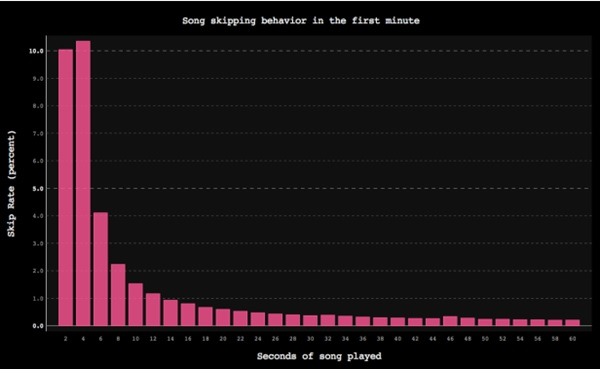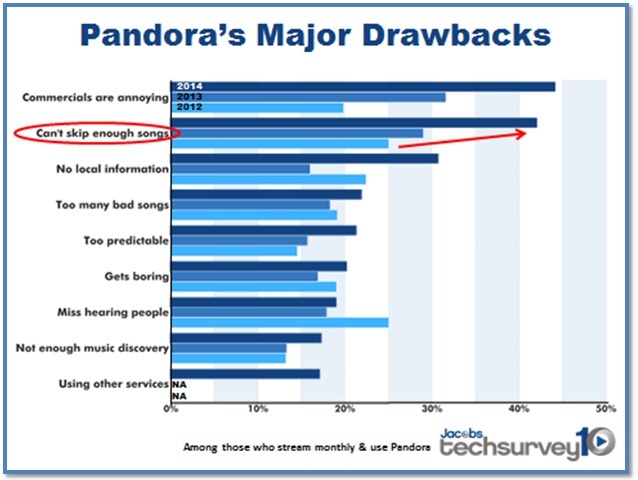 Bill Jacobs has done his share of auditorium test sorts, clock designs, and music architectural projects over the past two decades at Jacobs Media. Today, he reflects on new consumer data that just might cause you to think a little differently about how music is tested, scheduled, and presented. – FJ
Bill Jacobs has done his share of auditorium test sorts, clock designs, and music architectural projects over the past two decades at Jacobs Media. Today, he reflects on new consumer data that just might cause you to think a little differently about how music is tested, scheduled, and presented. – FJ
Back in the day, “Turn on, tune in, drop out” was a counter-culture phrase first verbalized by Timothy Leary in 1967. Fast-forwarding more than four decades, that term has taken on a whole new meaning and describes the behavior of how many consumers – especially those in Gen Z and Gen Y – use media today. They turn it on, they tune it in, and if they don’t like what they hear, they drop out.
Fascinating new data has emerged showing how people use pure-plays like Spotify, and how the ability to “skip” a song is now a predominant behavior. The question for radio is to determine how closely aligned “skip behavior” is to “tuneout behavior” because if there is a strong relationship, radio has yet another major issue to concern itself about, especially in metered markets.
Spotify supplied the data, and the analysis is courtesy of Paul Lamere’s blog called “Music Machinery.” Spotify’s data infrastructure allowed Paul to process billions of plays from many millions of unique listeners worldwide. A “skip” is defined as any time a listener gives up on a song before it finishes. And the chart below looks more like “The Long Tail,” but in fact, shows just how prevalent – and quick – song skipping truly has become.
Here are some of his key findings:
- Nearly half of all songs are skipped before they end
- More than half of all songs are skipped after the first ten seconds
- The average listener to Spotify skips more than 14 times an hour
- Men and women skip at the same rate – 45%
- Mobile skipping (51%) is more prevalent than skipping from a desktop/laptop (40%)
- Skipping is significantly higher among teens and twentysomethings, compared to those over 30
Interestingly, the #2 complaint about Pandora in our newest Techsurvey is the inability to skip more songs. (Of course, annoying commercials is the biggest drawback.) This reinforces the Spotify study, and is a reminder about just how fickle and “in the moment” consumers have become.
It also speaks to the limitations of music research when measurement is real-time, and it’s is a reminder to all of us on the music programming side of the ledger that reactions to a two-second hook may be valuable in callout or an auditorium test, but it’s the total, real-time song experience that truly drives tune-in – and tune-out.
While it is valuable to have a “pecking order” to know the best testing songs as well as those that fare poorest, we have to also be realistic in the knowledge that there’s more to the task of preventing meters from migrating than just that quick song hook.
Radio has been fighting button-punching since the first car radio appeared. But today’s millennials that have grown up with remote controls, immediate gratification, singles versus albums, and a smartphone in their hands that can contain every song ever recorded take the skipping behavior to a whole new level.
Everything radio does has the potential for tuneout – everything – and this data clearly shows just how prevalent this behavior is.
While the original meaning of “turn on, tune in, drop out” has changed dramatically, it’s incredibly apropos in today’s media consumption environment.
- Media And Technology In 2025: Believe It Or Not! - April 18, 2025
- In Radio, You Just Never Know - April 17, 2025
- The Secret To Making A Great Podcast (And Great Radio) - April 16, 2025






I’ve always believed just playing the “best” songs in the “perfect” rotation is not what makes you win. It is about the total experience. We live in an ADD world and we need to surprise people to keep them engaged.
True that, Steve. People are skipping past their own lists on Spotify because they’re bored and are looking for surprise and something different. Hello, radio.
I agree with Steve. It’s the total package and experience. However, a tune-out is still just that. aka The hits. Without the shits.
Thanks, Clark.
Funny, I see this research as a real opportunity for Spotify. I skip songs on my Spotify playlists all the time. In some cases its my mood (a song I want to hear today I might not tomorrow, but might again the next day), but I also do get burned on my playlists and figuring out what to add can take a lot of work.
Setting up a Pandora station in a genre is a good way to spice up a playlist, but you have to sit through each song, annotate it somehow and add the tracks I like to playlists one by one. Work, work, work! A Spotify music recommendation service that suggests list of tracks for each playlist based on its content would be awesome – one where you could just check the tracks you like and hit “add to”.
If radio wanted to beta test a value add to an on demand music streaming service, this would be a good one. It might make a good add on app too – export your playlists to the app, get recommendations then add the ones you like to Spotify/Rhapsody/Beats/Google Play Music/, etc.
Some great thoughts here, Bob. Clearly, radio can benefit from the metrics truth the pure-plays provide.
Good point.. it’s a totally new world now …. The question now Is is it just the beginning or the norm …
Great read Bill!
Thanks, Frank, on behalf of Bill. Appreciate your comment…and we think it’s the norm.
Check out this different POV from Jeff Schmidt who completely disagrees with Bill’s post.